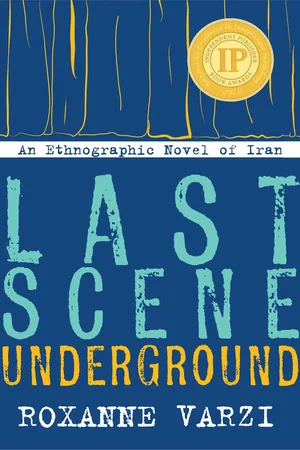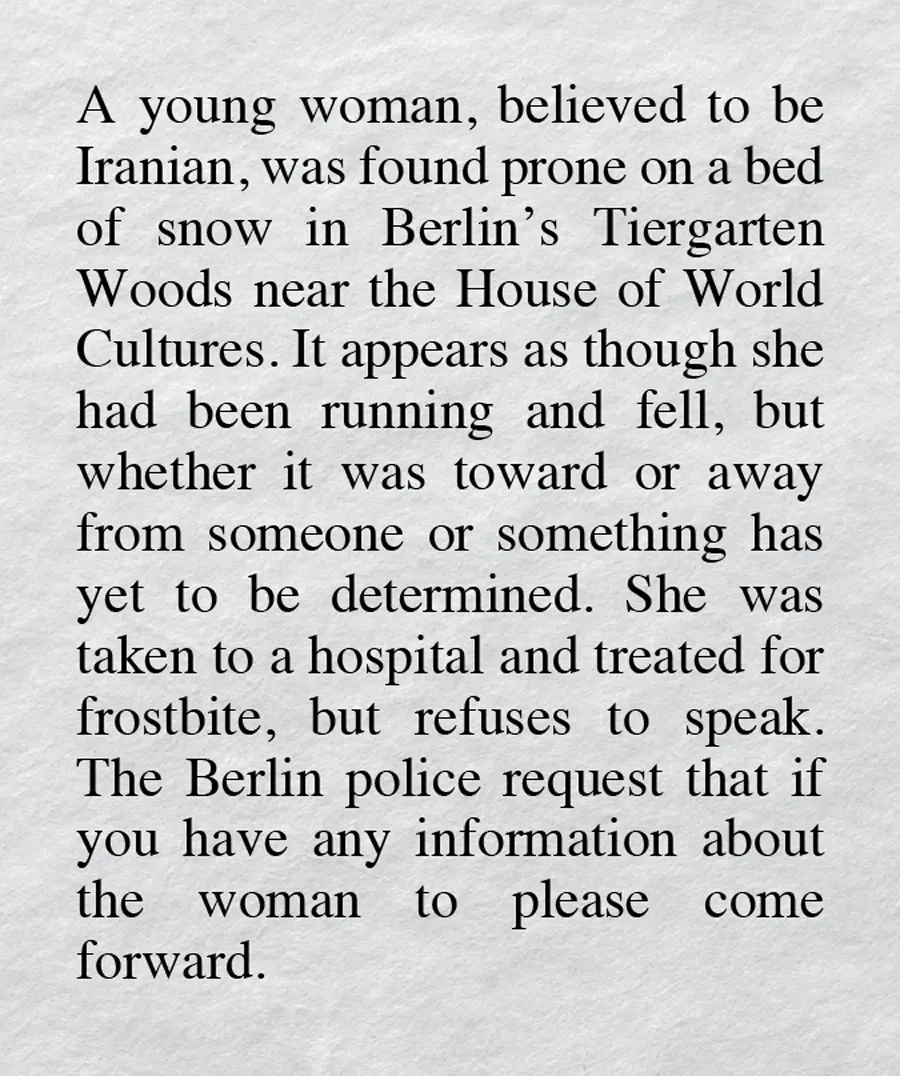![]() Last Scene Underground
Last Scene Underground![]()
In the Name of God
The story begins or ends, depending on whether you open this notebook in English (read left to right) or in Persian (read right to left), with a German newspaper clipping:
Toward or away from? I wish I knew.
Imagine that night: the total and enveloping silence of a growing snowstorm and a woman alone, waiting or escaping, about to fall—a distant figurine in an unbreakable snow-globe.
All that’s left of her is this fading foreign newspaper clipping and either the beginning or the end of a story.
![]()
Islamic Morals
Leili fidgets anxiously with the zip of her red knapsack in the security line outside the green gates of Tehran University. A student ahead of her decked out in a hot pink russari, veil, refuses to remove her nail polish.
“Come on, you’re holding up the line,” someone complains behind her.
“Arrest her; I’m late,” another man only half jokes.
The flustered guard finally steps aside for a moment and the crowd of angry, late students overtakes the offender and rushes in unchecked. Leili moves as quickly as she can without breaking into a totally improper run, across the courtyard, into the Faculty of Science building and all the way to the top floor, where she walks into class late and out of breath.
The professor’s back is turned to the chalkboard, where she very carefully pens “The downtrodden will be rewarded in paradise,” as Leili slips behind a mountain of students who descend in stadium seats toward the lectern.
The professor turns, wipes her brow with the back of her hand, smudging her thick black chador with chalk dust, and eyes Leili, examining for a moment her black russari and plain jeans—nothing worth reporting.
The classroom is filled to capacity. Islamic Morals is an elective but not a choice.
A young religious woman in a perfectly pressed black chador, round gold reading glasses and lips that smack of waxy ChapStick glares at Leili. Another religious student with a tightly trimmed beard and neatly stacked reference books at the ready also eyes her. She turns her gaze toward the slouched and half-asleep long-haired hipster next to him who wears black jeans and colorful Pumas. If he slouches any farther, he might slip out of his seat or fall over onto the person next to him—a young, handsome man in a loose-fitting oxford, black pants and the kind of religious bushy beard that announces that he’s not here to study. Leili makes a mental note to avoid him; she wishes that he were the one slouched and asleep, but he’s awake, alert and observing her.
No seat in sight, Leili turns to exit when a chadored student stands and offers Leili her seat.
The professor witnesses the exchange. “Sit,” she tells the chadori. Then she looks Leili in the eye and says, “There are always extra seats available for the willing.” She is already dragging and banging a metal folding chair across the stone floor to the center of the room where she stops and waits for Leili to join her.
Leili perches on the edge of the chair, aware that her too short and too colorful baby blue
rupush is inching up her thighs and exposing her Levi’s. She feels a hundred eyes on her back and her professor’s steady gaze overhead as she pulls out her notebook and neatly pens “In the Name of God”—
. She looks up, ready to take notes. Satisfied, the professor walks swiftly back to the chalkboard. Leili detects a click of high heels under the swish of her chador.
At the chalkboard she turns dramatically to the class and begins her lecture. “Essence, Islamic essence,” she says. “Does carrying prayer beads and muttering prayers aloud for all to see make a man right with God?”
“No,” the professor answers her own question. “Does throwing coins into the alms depositories as you enter the highway protect you for your journey if you do it while playing loud hip-hop music?”
Once the professor is ensconced in the day’s lecture, Leili begins her doodles. From doodling she progresses to her lists. Groceries: eggplant, onions, tomatoes, cucumbers, lemons, lettuce; paints—she needs new paints for Saturday’s class—crimson, ochre, mustard, ash . . . cigarettes for her father. She thinks of him sitting alone at home staring into the smoke, and a little dark cloud passes over her.
Her professor’s voice projects to make an important point:
“Riyah . . . showing off a religious demeanor, like thumbing prayer beads while thinking of your girlfriend, or giving alms just for self-protection or . . .”
Veiling . . . Leili thinks, remembering a woman defiantly riding a motorcycle and wearing a cherry-red helmet through rush hour traffic. She smiles to herself. She closes her eyes and imagines herself speeding through Tehran on a motorbike past the only uncovered female creatures in the city—the tall, slender cypress trees that rise out of the joobs, wide open ditches along the street. A dark oval that stains the white bark of every cypress forms an eye that watches Leili as she floats by in her daydream.
“Riyah,” the professor repeats.
Leili opens her eyes and returns to writing her list. Nuts—she needs trail mix for her hike this weekend: raisins (the long green ones), dried mulberries, pistachios and cashews or walnuts (fresh ones, already shelled). It’s walnut season now. When the page is nearly filled and the hour almost over, Leili prickles at a smell of imported deodorant, a collision of lavender and Clorox. She looks up to find her professor standing over her. It’s too late to slam the notebook shut.
“I asked you a question,” her professor says sharply.
Leili clears her throat.
A slight smile crawls across her professor’s lips as she tells the class to repeat the question.
Leili’s cheeks burn, her pulse rushes, her stomach turns.
“When is it appropriate for a layperson to interpret a spiritual leader’s decrees?” the students recite in unison.
Leili knows the answer is “Never.” She glances down at her notebook and shifts in her seat. Her chest thumps. She fingers her gold chain, feeling for the delicate cross beneath her shirt. The cross beats back and forth against her chest like an out-of-whack pendulum or fleeting prayer. She imagines herself wearing a cherry-red helmet. She sees a whirl of tall white cypresses speed by her with their steady watching eyes and she whispers, “Always.”
There’s a collective gasp from the room.
Her professor glares at her. “You misheard. I did not ask when it is not appropriate, but when it is appropriate to interpret a text,” the woman says, waiting for Leili to play along.
Leili raises her eyes to meet her professor’s glare and feeling slightly queasy says, “A person should be free to make her own interpretations.”
“Even of God’s Word?” the professor snaps.
Leili nods slightly and immediately feels all of her blood rush to her head.
Her professor solemnly walks back to the blackboard and slowly and deliberately erases the board. The hollow of held breaths, the rhythm of the professor’s eraser, back and forth, back and forth, wool on slate in rhythm with her short, tight staccato breaths and Leili’s fingernail scraping intently at a speck of gum on her metal desk echo loudly in the otherwise still classroom.
When only the word paradise remains, the professor turns and orders them out: “Dismissed.”
Leili is frozen to her seat as waves of students rush past all around her. Only one student pauses long enough to catch her eye—the bearded student studies her for a moment and then smiles before walking away.
Leili stands limply.
She mutters “with your permission” as she walks past her professor’s turned back.
Without turning to face Leili, the professor says, “Watch yourself—others will not be so tolerant to one who disrespects the principles for which so many of our young martyrs died.”
Leili clears her throat to speak.
“Go.” Her professor has spoken.
![]()
Murals
Night comes and with it crowds as thick as Tehran’s pollution. Neon warning signs tell the elderly, people with pacemakers and pregnant women to stay home. A crowd of students moves like a colony of black ants in and out of bookstores, the cinema (where a silly comedy is playing), the music store (where sheet music is stacked below hanging sitars), the pizzerias, cafés and a professional art store. Leili pauses to admire the alluring jars of brilliantly ground pigments that glimmer in the fading light—titanium, cerulean, cobalt and manganese—colors as vibrant as their names. She feels a tap on her shoulder and jumps.
“Sorry,” an older woman apologizes, “I thought you were someone else.”
“It’s OK, I was . . . just . . . ,” Leili starts to say, but the woman has already been swept into the mad rush hour crowd.
Three days it has taken Leili to summon the courage since her outburst in class to come close to the university district and now she’s determined to get home as quickly as she can.
Her parents thinks she’s in class until six, so she takes the long way home, a more secluded route, winding up hilly Mohammed Beg Street where the climb is steep and the recently paved tar is still cushiony hot. Every few steps she looks behind her, but every second man has a beard—none of them as young or as handsome as the one in class.
Her russari and rupush are already unknotted and unbuttoned as she walks through the apartment door. “I’m home,” she calls, turning on lights as she moves down the silent and dark hall.
“Out here,” her mother, Saqi, calls back.
Leili walks through the large receiving room, past the kitchen to the balcony, where her mother stands to greet her.
Leili hugs her cushiony mother tightly.
“What’s wrong?” Saqi asks.
“Nothing,” Leili whispers. She peers over the balcony rail to avoid her mother’s eyes. Tehran sprawls beneath them: a cosmos of skyscrapers, snow-capped peaks and a smog-induced ultraviolet sunset that obscures the city’s underbelly of propaganda.
“Ever notice we can’t see the murals from up here?” Leili says without turning.
“The mura...







